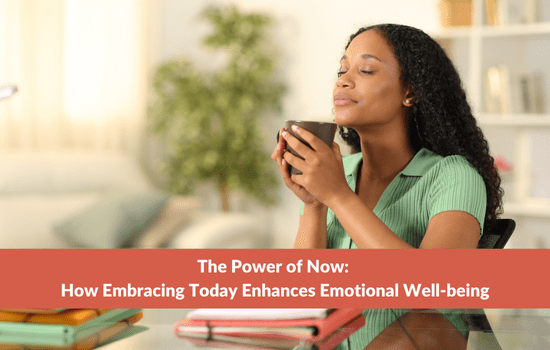Mindfulness, or the practice of fully engaging with the present moment, is a powerful tool for enhancing emotional well-being. This practice affects our relationships and happiness and plays a significant role in improving emotional intelligence.
Living in the Present: Boosting Emotional Well-being by Embracing Today

At its core, embracing the present moment means letting go of past regrets and future anxieties to experience life as it unfolds fully. This approach is a philosophical idea and a practical strategy for fostering greater emotional health and understanding.
Why Embracing the Present Moment Matters
In our fast-paced world, it's easy to become overwhelmed by daily responsibilities and distractions, which I call a "drive-by life" in my second book, The Power of Emotion.
Mindfulness, or being fully present, offers a way to navigate these challenges more effectively. Here’s why living in the now is crucial:
-
Reduces Stress and Anxiety: By focusing on the present, we can lessen the impact of stress and anxiety, which often stem from dwelling on past or future uncertainties.
-
Enhances Well-being: Engaging fully with the present moment can increase happiness and satisfaction by appreciating life’s simple pleasures.
-
Improves Focus and Productivity: Concentrating on one task at a time can boost productivity and decision-making, reducing the scatter of multitasking.
-
Strengthens Relationships: Mindful communication fosters deeper connections and understanding, enhancing the quality of our interactions.
-
Promotes Self-awareness: Mindfulness helps us better understand our thoughts and emotions, leading to personal growth and improved self-regulation.
How Mindfulness Impacts Emotional Health
Practicing mindfulness has several positive effects on emotional health:
-
Reduces Negative Emotions: By focusing on the present, we can lessen feelings of anxiety, depression, and stress.
-
Enhances Emotional Regulation: Increased awareness of our emotions allows better management and response.
-
Improves Mood: Focusing on the present can elevate mood and overall happiness.
-
Increases Resilience: Mindfulness helps us stay grounded and cope better with challenges.
-
Promotes Self-compassion: Treating ourselves with kindness and understanding reduces self-criticism.
-
Encourages Acceptance: Accepting the present moment, including all its emotions, leads to a more stable emotional state.
10 Practical Mindfulness Strategies
Incorporating mindfulness into your daily life can be simple yet transformative. Here are some practical tips:
-
Breathing Exercises: Spend a few minutes daily focusing on your breath to center yourself.
-
Mindful Eating: Pay attention to the sensory experience of eating, savouring each bite.
-
Mindful Morning Routine: Start your day with intention, setting a calm tone.
-
Mindful Breaks: Take short breaks to check in with yourself and reset.
-
Mindful Movement: Apply mindfulness to activities like walking or yoga.
-
Gratitude Practice: Reflect on what you’re grateful for at the end of the day.
-
Limit Multitasking: Focus on one task at a time to improve efficiency.
-
Mindfulness Apps: Use apps for guided meditations and mindfulness exercises.
-
Mindful Listening: Practice being fully present in conversations.
-
End-of-Day Mindfulness: Incorporate mindfulness into your bedtime routine to ease into sleep.
Embracing the present moment through mindfulness can profoundly impact your emotional health and overall well-being. For deeper insights, consider reading my book The Power of Emotion: A Practical Approach to Making the Most of Your Emotional Intelligence or exploring journaling with The Mindful Journal: Cultivating Emotional Intelligence through Reflective Writing.
More Motivational Reads Here »
How Emotionally Intelligent Are You?
Sign up for Linda’s monthly tips to build your Emotional Intelligence and reduce Emotional Hijacking!

















